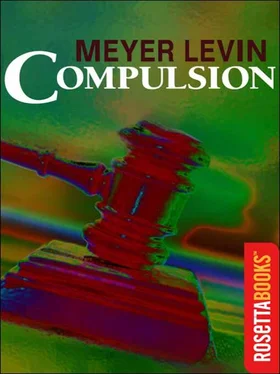This breaks the spell, he tells himself. And he tells her she might just as well ask if the birds are speculating about being watched by human gods.
“Why not?” she says. “Last night you were arguing that birds have intelligence and can think.”
“Then perhaps we exist only in the minds of the birds,” he says.
Ruth smiles. “Philosophy 3,” she says. “Berkeley.”
“Well, why not?” he persists, irritated. “What proof is there of anything else? If God exists, it is because we created him in our minds. And if man can conceive of God, then God is less than man – he is merely a conception in man’s consciousness. Isn’t that right?”
“I know it’s logical,” she says softly, “but it seems so conceited. According to that idea, everyone is his own God.”
“Why not?” he demands again. She is once more merely the female, refusing to recognize logic! Can’t she see that a person, a consciousness, can be sure only of itself alone? A flood of ideas rushes through his mind – the “God is dead” of Nictzsche – but it is no use explaining to her. Judd sees the archaic bearded gods, the Jehovah – all those gods that little men had invented to fill up their areas of fear. Even his father doesn’t have the nerve to swing out alone into the universe, to admit God is dead. No. He still sends cheques to the Sinai Temple.
Ruth seems somehow to have followed part of his thought. “I thought you were an atheist,” she says. “Are your folks atheists, too?”
It angers him that she has touched on his folks. What should that have to do with his beliefs? “My father still adheres to vestiges of Jewish superstition,” he declares. “He still belongs to a temple.”
“Do you have brothers and sisters, Judd?” she asks.
He feels even more resentful; she has diverted him from the main discussion. “I have two older brothers,” he mutters. “But they’re just Babbitts.”
Looking up at the sky, Ruth tells him, “My folks are agnostics. I think I am too.” Then, with almost an apologetic note: “Oh, Judd, sometimes the world seems so beautiful, like here, don’t you feel that things have to be good?”
“Good?”
Her warm throaty laugh acknowledges that sophisticated people don’t speak of such sentimental concepts. Oh, she remembers from last night. His philosophy. There is no such thing as good or evil. Things just are.
“What about the beauty in evil?” he challenges. “What about Baudelaire?”
Ruth says, “Of course, there is a deeper kind of experience, as in Dostoevski, an evil that has good in it too.”
“No! There is only experience itself!” Judd insists. And he feels he is almost ready now for his intention. He feels that somehow she has revealed herself, she is really from the other side, from the enemies of his own kind. He guides the conversation now to the Medici, to Aretino, to the rare book he wants to translate, listing all the forms of perversion.
“Are you trying to excite me?” Ruth asks.
“Why not? I’ve got you alone here.”
“Yes.” She is a trifle breathy. Then she tries to return to the lighter tone, impersonal. “You men! For all we intellectualize about it, the double standard is still in force. Men want women to be pure, don’t they?” And then, with a sudden burst, “Oh, darn, Judd, sometimes I think the whole question is silly, and what am I waiting for, and I just wish something would happen to me so I would get rid of the whole question.”
“It’s well known,” he says, “that every woman really wants to be raped.”
“Oh, don’t talk like a callow youth with a line,” Ruth answers.
“Well, you invited it,” he snaps, beginning to feel the necessary anger toward her.
“It’s not really like that,” she says. “I think what every woman dreams of is more like a dream I used to have as a little girl, that the great lover is going to climb through the window, and then something wonderful will happen.”
She continues, appealingly, and it is anguish for me to imagine her saying this to Judd, for this is a fantasy Ruth once confided, so intimately, to me. “When I was a little girl, we used to live in a downstairs flat where there were bars on the windows, and I used to imagine that was why the bars were there, but that somehow my Lochinvar would come in, even through the bars. It used to give me kind of nightmares, but I knew I wanted to have those nightmares.”
He moves so that the whole length of their bodies touch, as they lie side by side in the sand. She turns her face to him, like on a bed, Judd thinks. “Please don’t – you know – get excited,” Ruth says.
“I believe in doing everything I want to do.”
She looks directly into his eyes. “No. How can you, Judd? I mean, there are things people think of, impulses, not only sex-”
“If we imagine things, then those things exist in us. It’s only cowardly not to do what we want.”
Her voice becomes low, intimate, almost pleading. “I know, Judd. Ideas like that, Nietzsche and such ideas, they may seem very logical. We can even believe them with our minds. But we don’t have to do them.”
Is the fear coming up in her? he wonders. For that is what he would need to go through with it.
“But, Judd, suppose everyone believed like that,” she whispers. “Then everyone would be justified in doing anything. Even murder.” Her whisper is somehow schoolgirlish, and he has an impulse to laugh, yet to kiss her and tell her not to be scared.
He hears his own voice repeating his favourite ideas. There have to be people who are ready to explore all the possibilities of human experience.
“Oh,” she says, as though trying desperately to keep up with him, “oh, there have been plenty of people who have found out all about evil.”
But the higher the type of mind, Judd says, the more there is to be discovered.
And then she says it. Lightly. She hopes he doesn’t feel, because he has such a brilliant mind, that it is his duty to taste every crime like rape and murder.
“Oh, the murder now won’t be necessary,” Judd remarks, almost idly. And he catches himself. But she is too confused to notice meanings within meanings. Her brows are contracted, a shadow is over her face.
“I mean,” he says, “if I were to rape you now, I wouldn’t have to murder you because it would be unlikely that you would announce that you had been possessed. You would be more likely to keep it a secret and become my mistress.” She is breathing quickly. If she makes a move to get up and run away, he knows her movement will unleash him from the last restraint. His arm, his hand holding the heavy field glasses, will describe an arc…
But she does not move. Are tears coming into her eyes? There is such a questioning in them, such a dismay. And now the moment has come for him, for an act of will. Inwardly Judd feels tumultuously threatened; he doesn’t dare examine what doubts may be rising in him, but some horrible upheaval is there, as if all, all he were ever sure of were suddenly crossed out, wrong! And it is a partner-feeling, too, to the strange sense of almost – almost – Of almost being free, almost attaining. Yes, attaining! The same feeling that he experienced the other night, beside the cistern. To reach the sense of having done, done!
With an act of will, he rolls his body upon her. Ruth’s body is rigid. Her face is so utterly close to his that Judd can no longer see it, only the eyes, still puzzled and hurt.
“Please don’t,” she begs. “Judd, please don’t.”
He tries to insert his knee between her legs, and recalls some definition in a piece of sex literature that it is really impossible to rape a woman, that in the last moment, even against her conscious will, she physically consents.
Читать дальше












